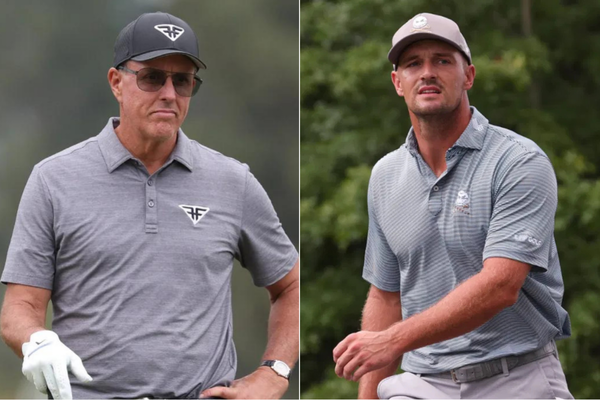
via Imago
Image Credits: IMAGO

via Imago
Image Credits: IMAGO
Bryson DeChambeau has become one of the most talked-about names in golf, both for his on-course dominance as a leader in LIV Golf and for how he’s promoting the game off the course through his YouTube channel series, Break 50. Today, with 2.1 million Instagram followers and a loyal fanbase, he’s enjoying the limelight. But let’s not forget, there was a time when he faced heavy criticism for jumping ship from the PGA Tour to LIV Golf. Fame, as they say, has its price.
To his credit, DeChambeau has worked tirelessly to change public perception—not just of himself but also of LIV Golf. Even fellow LIV golfer David Puig gave him a shout-out for his relentless efforts to improve the league’s image and bring fans on board. And honestly? It’s working.
But is his popularity purely because of his efforts? Phil Mickelson doesn’t think so. Instead, Mickelson has a different theory: he believes DeChambeau’s popularity owes more to flaws in the PGA Tour’s media model than to DeChambeau’s personal efforts.
ADVERTISEMENT
Article continues below this ad
In a tweet earlier this year, Mickelson claimed that the PGA Tour’s “monopolistic control of media rights” limits players’ ability to promote themselves and the sport to younger audiences. “What [Bryson] is doing now wasn’t allowed before LIV,” Mickelson wrote, calling the PGA Tour’s system “broken” and blaming it for being “totally US-centric and with no plan to globalize opportunities.”
View this post on Instagram
That’s certainly a take—but does it actually hold up? Not really. YouTuber Joe Pompliano wasted no time jumping in to debunk it: “If you comb through the pages of the PGA Tour player handbook, you won’t find a single rule that would prevent DeChambeau from creating a YouTube channel. In fact, DeChambeau started posting on YouTube while he was still on the PGA Tour.”
So you see, Bryson DeChambeau being famous after joining LIV has basically nothing to do with PGA rules. Instead, it’s his own efforts—and his knack for connecting with fans—that have made him the star he is today. That said, Mickelson’s comments do bring up an interesting question: is the PGA Tour’s media model outdated?
ADVERTISEMENT
Article continues below this ad
What’s your perspective on:
Is Bryson DeChambeau's success proof that the PGA Tour's media model is outdated and restrictive?
Have an interesting take?
Does PGA control their players’ social handles?
If you’re wondering whether the PGA Tour controls what players can post on their social media, the short answer is no—they don’t. it’s a standard practice across major sports leagues for media rights to belong to the league itself. These rights are the backbone of those jaw-dropping, multi-billion-dollar broadcasting deals, which, in turn, fund the hefty salaries of athletes—or in the case of golf, the millions in prize money. And the PGA Tour is no different.
Now, when it comes to using PGA Tour footage, players just need to follow a few guidelines. According to the player handbook, they can request highlights, live clips, or even archived footage to share on their social platforms—as long as they don’t run ads on it. The Tour even has a dedicated team to help players access what they need.
ADVERTISEMENT
Article continues below this ad
And if you’re thinking about DeChambeau’s vlogs, there’s no reason those couldn’t have existed while he was still on the PGA Tour. Players can ask for special access to film during tournaments, with the Tour’s content teams helping make it happen.
So, whether Bryson DeChambeau’s playing in LIV Golf or on the PGA Tour, his rise in popularity is a direct result of his own creativity and connection with fans—not because of any change in league rules. At the end of the day, DeChambeau’s success off the course is all about how he’s built his brand, one video at a time.
ADVERTISEMENT
ADVERTISEMENT
ADVERTISEMENT
ADVERTISEMENT


Is Bryson DeChambeau's success proof that the PGA Tour's media model is outdated and restrictive?